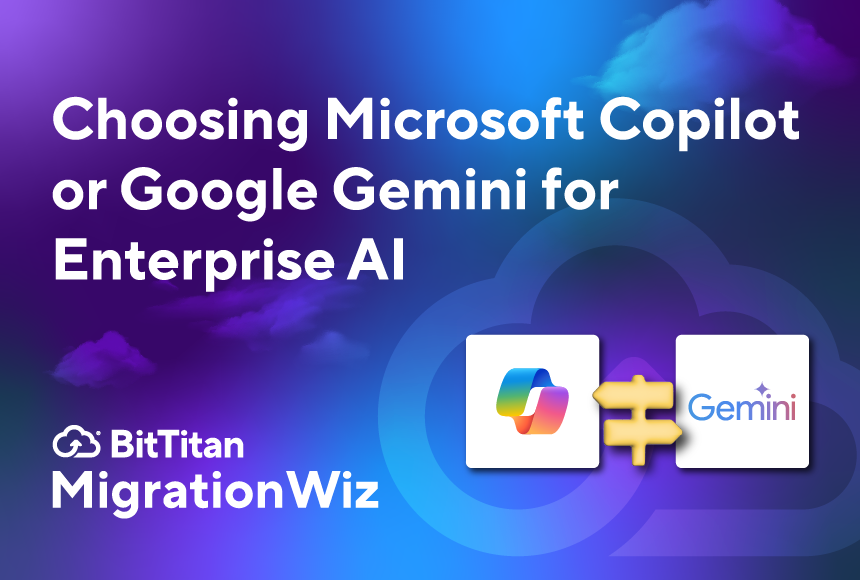It seems that everyone is trying out artificial intelligence (AI) these days, whether it’s for writing, creating, analysis, or better search. Plenty of people have already figured out ways to incorporate AI into their work. As often happens with new technologies, early adopters have been experimenting with different AI tools, demonstrating how they can be used to enhance productivity. But any new tool should be vetted for its fit with the organization before it’s adopted and fully integrated into the workplace.
MSPs play a key role in helping clients modernize their technology and maximize its usefulness. Clients will be looking for your advice on how to seriously adopt AI and make sure it’s not just something to play around with. Microsoft and Google have built AI into their widely-adopted collaboration platforms – in some cases it’s just a matter of turning the feature on. But before your clients take the leap toward enterprise AI, they may have questions about what’s right for them.
One thing you’ll find is that it may be necessary to do some tenant consolidation before an organization can truly leverage the benefits of AI. That’s where MigrationWiz can help. Once you’ve chosen an AI solution, it may be time to consolidate your tenants with MigrationWiz. The final step in our guide will explain how MigrationWiz can get you AI ready.
Meet Copilot and Gemini
Microsoft Copilot and Google Gemini are the leading enterprise AI options. This has a lot to do with the fact that they’re integrated into two ubiquitous collaboration platforms. Both solutions can be used effectively to enhance workplace efficiency. They do have their differences, though, primarily with integration, security, and enterprise usability. Let’s take a look:
Integration – It will come as no surprise that each AI tool works best within its own environment. Microsoft Copilot is deeply integrated into the Microsoft 365 ecosystem, giving it the ability to work across Word, Excel, Outlook, SharePoint, and Teams. It’s designed to enhance productivity within organizations already using Microsoft services.
It logically follows, then, that Google Gemini integrates into Google Workspace, helping link Docs, Sheets, Gmail, and Meet. Gemini also enhances Google Search and Android devices.
Security and compliance – As each new tool is added, you can never take your eye off security and compliance. Both Microsoft and Google follow stringent security measures. Copilot uses Microsoft’s security framework: Microsoft Entra ID (formerly Azure AD) for identity management, Microsoft Purview for compliance, and Defender for threat protection. It all adds up to enterprise-grade data protection, a solid choice for regulated industries.
Google Gemini uses Google Cloud encryption, access controls, and AI safety protocols. Gemini is built on Google’s AI infrastructure, which incorporates ethical AI principles and continuous security monitoring.
AI models – Microsoft Copilot is powered by OpenAI’s GPT model. Organizations are already finding many ways to use Copilot to enhance business productivity, understand data, and automate workflows. Some initial tasks uses include time-saving email summaries, report generation, and data visualization.
Google Gemini is Google’s proprietary AI model. It was designed for a range of tasks including creative content generation, natural language understanding, and advanced data analysis. Gemini also integrates with Google’s AI-driven search features and development tools.
Preparing for enterprise AI – With all the current and future potential of enterprise AI, organizations will still need to prepare so they can make sure to reap the benefits. One thing to keep in mind is that Microsoft Copilot doesn’t work across multiple tenants. So getting the most out of AI in a Microsoft 365 environment may have to start with a tenant consolidation migration project. Not a problem, of course, when you’ve got MigrationWiz in your toolbox. There’s also no official confirmation that Google Gemini supports multi-tenant environments, so you should verify its suitability based on your client’s situation.
Which One to Recommend?
The end of this article has links to official sources of information on Microsoft Copilot and Google Gemini. This is a rapidly-changing landscape, so it’s important to stay current and not rely on outdated assumptions. Here are a few important considerations if you’re helping an organization evaluate enterprise AI:
Commitment to a platform – For Microsoft-centric businesses, Copilot is the best choice since it seamlessly integrates with Microsoft 365 apps and provides enterprise security. Gemini is the logical choice for Google Workspace users and for leveraging AI-powered insights. Clients shouldn’t be concerned that they may have to change platforms to take advantage of AI, but if they’re still deciding where to commit, MSPs can help by providing an analysis.
Getting the most out of AI – Since the launch of ChatGPT in 2022, people have been trying out AI for both fun and serious endeavors. Any company that wants to “leverage AI” should make a plan for how it can be most beneficial. This will include defining acceptable uses for AI, workflow and application development, and providing appropriate user training.
Preparing the environment – Organizations with multiple tenants in Microsoft 365 will need to consolidate their environment before deploying Copilot. MigrationWiz is the tool to use for tenant consolidation, and BitTitan has the information and support you need to make any migration happen.
Go Forward with AI
Both Microsoft Copilot and Google Gemini offer significant AI-driven productivity enhancements. The best choice depends on an organization’s existing infrastructure, security requirements, and collaboration needs. If you need help planning a migration to support AI adoption, contact the BitTitan customer success team.
For the latest on Copilot and Gemini capabilities, stay up to date with official sources:
- Microsoft Copilot: Microsoft Learn
- Google Gemini: Google AI


